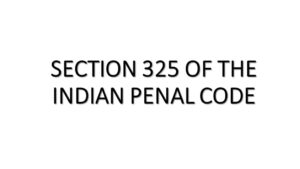Table of Contents
Introduction
Section 325 of the Indian Penal Code states that if someone voluntarily causes severe injuries to another person, they can be punished with imprisonment for up to seven years, and may also be fined.
An offence under Section 325 IPC i.e. voluntarily causing grievous hurt is a cognizable and bailable offence, which is triable by a magistrate.
A cognizable offence is one where no warrant by a magistrate is necessary to arrest a person suspected of having committed the offence and the police has the authority to arrest without a warrant.
Grievous Hurt under the Indian Penal Code
Grievous hurt is, as the name suggests, hurt that is serious or grave in nature. The Indian Penal Code divides injury caused into “hurt” and “grievous hurt”. Hurt has been covered under Section 319 of the IPC, whereas Grievous Hurt has been described in Section 320 of the IPC.
According to Section 320, an injury could be designated as grievous if it is emasculation, permanent privation of the sight of either eye, permanent privation of the hearing of either ear, privation/destruction/permanent impairing of any joint, permanent disfiguration of the head or face, fracture or discoloration of bone or tooth, or any hurt which endangers life or which causes the sufferer to be during the space of 20 days in severe bodily pain, or unable to follow his ordinary pursuits.

What is meant by Voluntarily Causing Grievous Hurt?
Section 322 of the Indian Penal Code states that whoever voluntarily causes hurt, if that hurt which he intends to cause or knows himself to be likely to cause hurt of grievous nature, and if the hurt that he causes is grievous hurt, is said to voluntarily cause grievous hurt. Thus, the intention of the person causing grievous hurt is important. If the person did not have any intention to cause such hurt and the same is due to an honest mistake, it would not attract criminal charges. Thus only voluntary causing of grievous hurt will have penal consequences under the IPC.
Under Section 322, the two essential ingredients are the ‘intention’ to cause and the ‘knowledge’ that the act is likely to cause grievous hurt. If in any act of causing grievous hurt, the intention and knowledge to do so are not present on the part of the person committing the act, he cannot be charged for causing grievous hurt voluntarily, under the Indian Penal Code.
Also, Read SECTION 304A INDIAN PENAL CODE
Section 325- Punishment for Grievous Hurt
According to Section 325 of the IPC. whoever (except in cases provided by Section 335), voluntarily causes grievous hurt, shall be punished with imprisonment of either description for a term which may extend to 7 years and shall also be liable fine.
Thus, since grievous hurt is a serious crime, it is punishable with a maximum imprisonment of 7 years with an additional penalty in terms of fine.
Conclusion
A person charged with an offence under S. 325 can face severe penalties if convicted. On the other hand, it is similarly difficult for the prosecution to prove the charges levied by him/ her. This is why it is important for both the victim and the accused to thoroughly prepare for the case. A person involved in such a case must know all his/her rights before and after arrest. For this purpose, one can take the help of his/her Advocate.
One should also prepare a timeline of events and take it down on a piece of paper so that it is easier to brief the lawyer about the case. This will also help the lawyer to formulate a strategy to successfully conduct the trials and convince the court to adjudge in your favor.
FAQ
How to get Bail in a Grievous Hurt case?
The offene covered under Section 325 is bailable in nature, it is not extremely difficult to get bail. However, a criminal lawyer should be approached so that you are guided in the right direction and you get bail without much hassle.
What to do if involved in a false Grievous Hurt Case?
There may be instances where an individual must have been falsely accused of committing the offence of grievous hurt. In such cases, the accused must talk to his/her lawyer and explain the entire scenario to him/her without even minor alterations as such changes can have a big impact on the case.
